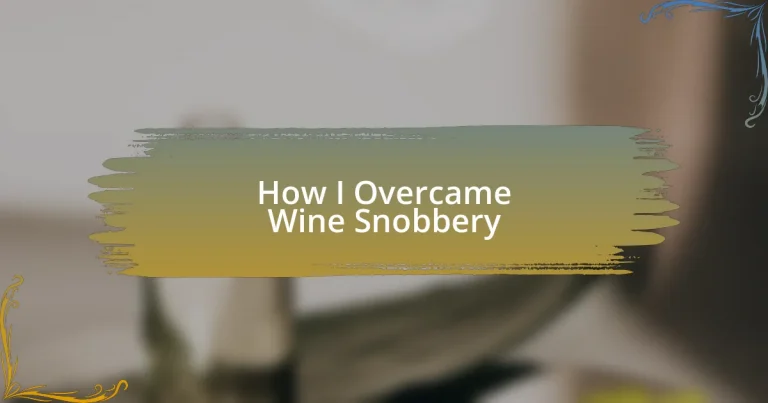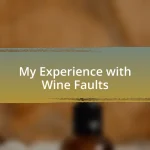Key takeaways:
- Wine snobbery often creates a barrier to enjoyment, prioritizing status over appreciation and alienating enthusiasts.
- Wine education empowers individuals to make informed choices, fostering community and connection through shared experiences.
- Common misconceptions, such as expensive wine always being better, are debunked through personal exploration and discovery of diverse options.
- Overcoming snobbery involves embracing casual tastings and focusing on personal enjoyment rather than adhering to pretentious standards.
Author: Clara Whitmore
Bio: Clara Whitmore is an acclaimed author and storyteller known for her captivating narratives and richly drawn characters. Her work spans several genres, including contemporary fiction and historical romance, often weaving elements of personal experience into her writing. Clara holds a Master’s degree in Creative Writing from the University of Edinburgh and has published three novels, which have garnered critical acclaim and a loyal readership. When she’s not writing, Clara enjoys exploring quaint bookstores and hosting literary workshops. She currently resides in Portland, Oregon, with her dog, Jasper.
Understanding wine snobbery
Wine snobbery often stems from a deep-seated desire to elevate one’s social status, making the beverage a status symbol rather than a source of enjoyment. I distinctly remember my first encounter with a self-proclaimed wine expert at a dinner party. The way he dissected every bottle, dismissing others in a condescending tone, made me question his motives—was he genuinely passionate about wine, or just trying to impress?
It’s fascinating how wine snobbery can create an exclusive environment, alienating those who might simply want to appreciate a good glass. I once hesitated to share a bottle of my favorite $15 Chardonnay because I thought it wouldn’t be “worthy” enough. Reflecting on that moment, I realized that wine should spark joy, not anxiety. Isn’t it more important to enjoy what’s in our glass than to worry about its price tag?
Moreover, wine snobbery can lead to an intimidating atmosphere, especially for newcomers. I recall feeling overwhelmed by fancy terms and pretentious taste descriptions during my first wine tasting. The pressure to conform to certain standards made me appreciate the simpler pleasures of wine even more. Why should we let snobbery dictate our enjoyment of something that’s meant to be savored?
Importance of wine education
Wine education plays a pivotal role in dismantling the barriers created by wine snobbery. I remember attending a workshop focused on understanding wine basics, where I discovered the delightful diversity of flavors and aromas. This knowledge transformed my view of wine from a source of intimidation to an expansive realm of exploration. Why should we shy away from a topic that can bring people together?
With education, we gain confidence in our choices, allowing us to appreciate the nuances of different wines without the fear of judgment. It was liberating when I learned to trust my palate rather than someone’s lofty reviews. I found myself enjoying wines I once considered “too pedestrian” simply because I understood their unique qualities. Isn’t it empowering to make choices based on our preferences rather than what we think is expected?
Moreover, wine education fosters a sense of community, as knowledge encourages open discussions and shared experiences. I recall initiating a tasting among friends, each bringing a bottle they loved, regardless of price. The laughter and stories that flowed just as easily as the wine made it clear: it wasn’t about the label but the memories we created together. Shouldn’t the beauty of wine lie in its ability to connect us?
Common misconceptions about wine
Many people believe that expensive wine is always better than cheaper options. I once thought this too, until I attended a tasting that included a $10 bottle alongside a $100 bottle. To my surprise, I found myself enjoying the budget-friendly wine much more! This experience opened my eyes to the idea that personal preference plays a vital role, often more so than price. Have you ever found joy in a wine that didn’t carry a hefty price tag?
Another common misconception is that wine must be paired with specific foods to be enjoyed properly. I remember the first time I tried a bold red with a spicy takeout dish. I braced myself for disaster, yet the flavors melded delightfully, creating an unexpected harmony. Isn’t it refreshing to realize that the “rules” of wine drinking can be bent? Wine is about enjoyment, not strict adherence to guidelines.
Many believe that wine only flourishes in traditional settings like fancy restaurants or posh gatherings. I’ve had some of my most memorable wine moments in my backyard with close friends, sipping rosé and sharing stories. These relaxed settings remind us that wine is meant to enhance our experiences, regardless of the venue. After all, isn’t the joy of wine found in the connections it fosters, not the surroundings it graces?
My journey with wine appreciation
My journey with wine appreciation began in what I can only describe as a rather naive phase. I remember hosting my first gathering, feeling pressure to impress my friends with a selection of high-end wines. My heart sank as I watched them sip the carefully chosen bottles, blissfully unaware of the labels or price tags. It dawned on me that true enjoyment came from the laughter and stories shared, not just the wine itself. Have you ever felt you were overthinking something that was meant to be simple and enjoyable?
As I continued to explore different varieties, I began to learn more about regions and grape varietals, but it was during a spontaneous wine trip with a friend that I truly fell in love with the craft. We stumbled upon a small vineyard tucked away in the hills, where the winemaker himself poured us a tasting. He shared tales about his passion and the unique characteristics of each bottle. It was in that rustic setting, surrounded by lush vines, that I realized wine isn’t just a beverage; it embodies culture, creativity, and connection. Have you had a moment that turned your understanding of something upside down?
Over time, my approach shifted from pretentiousness to curiosity. I found myself relishing the exploration of different flavors and aromas. I’ve had the pleasure of trying unusual blends that defied typical expectations and were, shockingly, delightful. Each experience felt like uncovering a hidden treasure, fueling my desire to learn more. How often do we limit ourselves by sticking to the familiar rather than stepping outside our comfort zones? Embracing this new perspective not only deepened my appreciation for wine, but it also opened new doors to friendships and conversations.
Techniques for overcoming snobbery
Occasionally, I found myself caught in conversations dominated by wine jargon, which only fueled the intimidation factor. To break free from this snobbery, I made a conscious decision to focus on what truly resonated with me. I began asking questions about the flavors and stories behind the wines, and in doing so, I discovered that most wine enthusiasts were eager to share—this transformed our dialogues into joyful exchanges rather than battles of expertise. Have you considered turning your curiosity into a conversation starter?
Another effective technique I embraced was hosting casual tastings without the pressure of prestige. I invited friends over, armed with a range of wines, from local favorites to those with quirky labels. The goal? Simple: to enjoy and discuss each bottle without the backdrop of expense. To my delight, many participants felt liberated to express their genuine reactions, allowing us to bond over laughter and shared experiences. Isn’t it amazing how shedding the “rules” can lead to connections that matter more than labels?
I also made it a point to visit local wine shops and ask for recommendations directly from the staff. During one visit, I chatted with a friendly clerk who pointed me toward a lesser-known bottle that ended up being one of my favorites. He treated wine as a personal journey rather than a status symbol. This experience reminded me that there’s beauty in the unpretentious and that everyone’s palate is unique. Have you taken time to seek guidance from those who truly love the craft?
Embracing diverse wine experiences
Expanding my wine palette was a revelation. One evening, I broke away from the expected choices and picked a Portuguese vinho verde. Its crispness and slight effervescence were delightful surprises, and I cherished the way it sparked conversations about lesser-known regions and varieties. Have you ever indulged in a wine that made you rethink your preferences?
I also actively sought out diverse wine events, which turned out to be exhilarating. At one local festival, I was greeted with an array of global wines—each table telling a unique story. I remember tasting a robust Malbec from Argentina while chatting with the winemaker’s daughter, who passionately shared her family’s history and the wine’s connection to their culture. Isn’t it incredible how a simple tasting can transport you to another world through flavor and storytelling?
Through these experiences, I came to appreciate the richness of wine beyond just the label or price tag. I learned that sharing a bottle can create bonds, whether it’s a rare vintage or a budget-friendly blend. Each sip became a chance to explore not just taste, but also the shared human experience. What treasures might you find by stepping outside the familiar?


